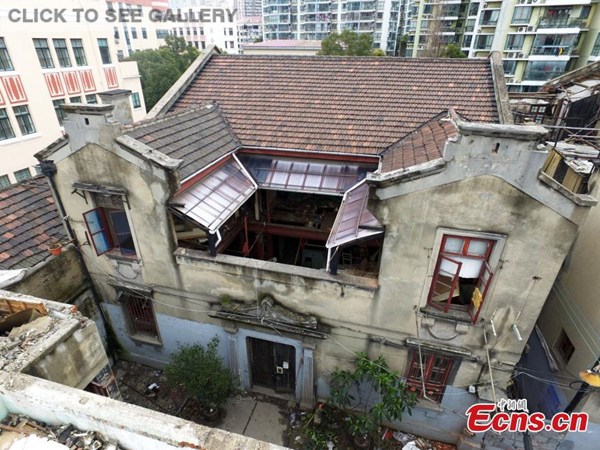The demolition of a former Japanese army military brothel used during World War II in Shanghai has been put on hold, according to the local government on Tuesday.
An unnamed media official with Hongkou district government told Xinhua that a historical assessment on the unlisted building had been launched.
"Whatever the result, we will do our best to preserve history," he said.
The two-story 1920s building was once home to more than ten households. It had been earmarked for demolition as part of an urban transformation project. The site will make way for a school expansion and a road.
Writer Chen Danyan posted a photo on the messaging app WeChat on Monday morning lamenting the loss of such an important piece of history.
According to the account of a Japanese national, Sakashita, whose father was an officer during WWII in Shanghai, the building was called Home of the Sea, and used as a "comfort station" for the Japanese navy. The man helped run the brothel between 1944 and 1945.
During the eight years of Japanese occupation of China, an estimated 200,000 women from China and many others from the Korean Peninsula, the Philippines and Indonesia were forced into sexual servitude by Japanese troops. Many of them died.
Experts have confirmed 166 "comfort stations" in Shanghai, more than 30 of them in Hongkou district.
This building, which opened in 1939, once housed 40 "comfort women" in its 17 rooms -- 10 were from Japan, 10 from Korea and 20 from China.
Xinhua reporters spoke to some older members of the local community who could still recall a Japanese song "I Am A 16-year-old Manchurian Girl".
Su Zhiliang, a professor with the Shanghai Normal University who has studied the issue for decades, said; "almost all the victims and residents near these 'comfort stations' know this song," he said.
On learning about the demolition, Su came to the building and removed the doors and window frames, which were described by Sakashita in his memoir.
"In the future, I hope these things will be housed in a museum dedicated to these women," he said.
Li Jingfang, who has lived near the building for decades, says the former brothel receives many visitors. Many from Japan and the Republic of Korea, she said.
However, she said the building was no longer fit for habitation.
In Gongpingli community, where the building is located, there are more than 200 residents. "The houses are dilapidated and have no bathrooms," Li said.
But Su believes that urban transformation should not necessarily mean demolition. "More importantly we should preserve the history of a city," he said, "The good and the bad."



















































